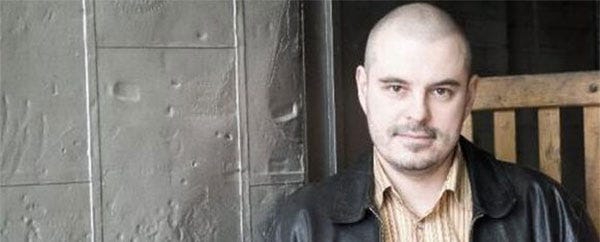Clint Hocking Leaves Valve, Newell Discusses Sequels
Of Hocking and Newell
Clint Hocking, he of Splinter Cell: Chaos Theory and Far Cry 2, has departed from Valve after eighteen months working as a something or other designer and level designer. Meanwhile, Gabe Newell has been talking to noted videogame blog The Washington Post about the company's structure and strategy. Observant readers will notice that this post contains two pieces of Valve news but not a shred of concrete information about any games in development. I reckon that's why Hocking left - he designed a couple of levels every week but couldn't find any games to put them in. After trying to drop a few into DOTA 2 when nobody was looking, he eventually left the building with a bag full of digital architecture.
The rumour mill suggested that Hocking was working on Left 4 Dead 3, a game that may or may not exist in any form. Hocking hasn't spoken about his decision yet, although his personal website does confirm the news.
As for Mr Newell, he was quizzed about the nature of Valve and its success. It's all about people.
There are a bunch of things, like the people who are really talented often don't fit into rigid boxes. It's part of why they're good. For example, Ken Birdwell was one of the first people here and he has a bachelors in Fine Arts -- he's an artist -- and he also happens to be able to program really well. At any other company he would be sort of forced to fit within an existing structure but if you look at the class of problems he's able to solve since he can animate, model, and program he's able to invent solutions that other people can't.
Gabe also talked about how Valve attempts to create an environment that supports employees.
We're always looking for ways to make this a better place and just be cognizant of people who have families. My wife, who worked here at the beginning when she was pregnant, is super annoyed about how most companies make it really difficult for their female employees to deal with raising kids so we're sort of hyper vigilant about making that as easy as possible. She feels like a lot of women get forced out of the workforce because of the trade offs they have to make and it tends to be this fairly large gap. She now runs this organization dedicated to helping from birth to around three years, so she sees how hard it is for most families to keep the mother engaged with her career during that period. A lot of times, after three years they've just sort of fallen out. And that's just another instance of a class of difficulties that we all have.
I'm sure we'll have new ones as our workforce ages and we go through different sort of demographic challenges. And we'll also have people who come in and say, as we've had, "I"m a member of the US national ultimate frisbee league team and we're going to nationals and I'm going to be gone for six weeks." That's awesome -- let's figure out how you can go do that. And I don't think that will be a problem that happens frequently.
And then there are games. As Hocking may have discovered, Valve doesn't create what people expect it to create and the risk-taking is admirable.
When we started out we were a single-player video game company that could have been really successful just doing Half-Life sequel after Half-Life sequel, but we collectively said let's try to make multi-player games even though there's never been a commercial successful multi-player game.
Then we tried to do Steam. There were a bunch of people internally who thought Steam was a really bad idea, but what they didn't think was that they would tell the people who were working on Steam what to do with their time. They were like "that's what you want to do wit your time, that's fine, but we're going to spend our time working on Half-Life 2. We think you're kind of wasting your time, but it's your time to waste."
In retrospect, it was a great idea, right? So the key thing was that people bear the consequences of their own choices, so if I spend my time on it the only persons time I'm wasting is mine. Over time, I think people sort of recognize how useful it is for people to vote with their time. There is a huge amount of wisdom in people's decisions about what they personally want to work on next.
There is a corporutopian vibe to many of Valve's statements about their corporate structure and it's easy to sneer. It's always easy to sneer - just pretend the clouds have planted a fish hook in our lip and roll your eyes in agony. Whether another Half Life sequel is important to you or not, it's good to know the company gives their employees freedom to work on the projects they're interested in. But, personally, I'd like to know that some of those employees want to work on a game, whether it has specs and crowbar in it or not. Valve can afford to take risks and I'd love to have seen what somebody like Hocking did when given the chance to throw the dice.
That's not to say that the structure wasn't compatible with Hocking's ideas. We don't know. But there's something appealing to me about the idea of Valve as a creative refuge for imaginative thinkers.
